|
Charles & Donna Mae (McCoy) Platt
|
|||||||||||||||||||||||||||||||||||||||
|
Compiled from family records and memories, from part of his obituary by William Ingligh Jr., and from a book "Making a Home in Stillwater: by Peggy McCormick, 1989.
The book excerpt was provided by Dolores Winston |
|||||||||||||||||||||||||||||||||||||||
|
Charles Eli Platt was the fourth son and twelfth child of Papa and Mama. He was born April 3, 1909 at 4:30 AM, at the homestead at Crystal. He attended the schools in Stillwater and finished high school there, about 1927
|
|||||||||||||||||||||||||||||||||||||||
|
Story:
"Papa traveled to Dallas for something, and Mama stayed behind. Papa sent a telegram saying he was sick and for Mama to come get him. Well, Mama never drove, so ten year old Charles climbed behind the wheel and off they went. No driver requirements of any kind then but the law DID say the all motorists had to stop at railroad crossings. At one crossing, the land around was very flat and Mama could see miles in every direction, so she could NOT understand the wasted time. She told Charles to go on across the tracks, don't stop! The one thing she hadn't seen was the police car! "Why didn't you stop there, young fellow?" asked the policeman. "I told him not to" replied Mama. "That'll be a $10 fine. Charles said Mama's anger lasted the remainder of the trip." |
|||||||||||||||||||||||||||||||||||||||
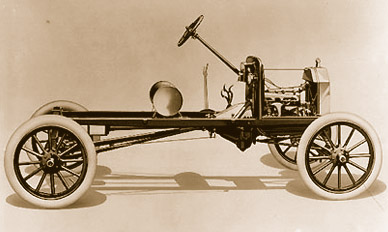 |
|||||||||||||||||||||||||||||||||||||||
|
Charles remembers taking the train to Oklahoma City to pick up new Model T's and driving them to Stillwater. The bodies were shipped separately by freight to Stillwater, so Charles had to sit on the chassis' gas tank tor the trip. OW!
|
|||||||||||||||||||||||||||||||||||||||
|
Story:
Harmon and Raymond had the Ford agency in Perkins, and Papa and Mama would often drive down to see them. One day, Charles and Fred put their heads together and decided to hitch hike to Perkins, but not to tell the folks. They told the folks they were going to walk to Perkins, and set out. They quickly got a ride and were waiting at Raymond's house when the folks arrived. "Thought you boys were going to walk", Papa said. His voice was controlled but they could sense the agitation. "We got a ride", was their reply. Nothing more was said, but when the time came to go home, Charles and Fred ran to the car and got in. Papa's words were "No, you boys wanted to walk. You get out. You are not going to ride". They started out walking, but just as it was getting dark, Raymond appeared in a car and drove them on home. Perkins is 30 miles south of Stillwater. That would have been a LONG hike. |
|||||||||||||||||||||||||||||||||||||||
 |
|||||||||||||||||||||||||||||||||||||||
|
So Next time they just rode Nellie !
|
|||||||||||||||||||||||||||||||||||||||
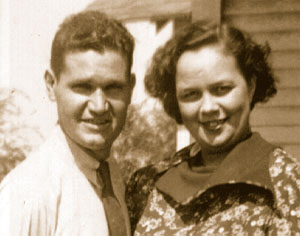 |
|||||||||||||||||||||||||||||||||||||||
|
Charles was a Boy Scout and one year the Boy Scouts all visited a Camp Fire Girls meeting. There he met Donna Mae McCoy. Her family were also pioneers, having made the run, homesteaded and lived on the homestead several years before also moving to Stillwater. Her father operated a hotel and second hand store.
Charlie was a family man through and through. The foundation of a good family is a good marriage, and Charlie and Donna Mae had one. She was just 16 and he 20 when they promised their plight to each another in1929, but they'd been high school sweethearts, and Charlie had known she was the only one for him from day one. And she was. |
|||||||||||||||||||||||||||||||||||||||
|
Charles and Donna Mae
|
|||||||||||||||||||||||||||||||||||||||
| It's difficult to imagine a man who loved his wife more than Charlie loved Donna Mae. Theirs was a relationship that never seemed to wane. There was always a fire there, and he was like a giddy school boy around his wife, head over heels in love with her for 66 wonderful years. Of course, they didn't have much, especially at the beginning. But it didn't seem to matter, because they both knew that as long as they had each other, they were rich. Maybe not rich in the things of this world, but rich in the things that money has never been able to buy, rich in things more valuable than silver and gold. One of their riches was singing, songs that they taught their children and then their grandchildren. Songs that families.... well, songs that almost no one sings any more, but songs that were fun and brought joy to evenings at home or to simple car rides (when there finally was a car) songs that could warm your heart or tickle your innards. No doubt the song that most typifies Charlie and Donna Maye's relationship, one they sang often, what could be called their "theme song," was "Side By Side." |
|||||||||||||||||||||||||||||||||||||||
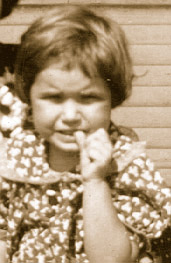 |
|||||||||||||||||||||||||||||||||||||||
| Young Mollyann, who grew up to be just like her wonderful Mother! | |||||||||||||||||||||||||||||||||||||||
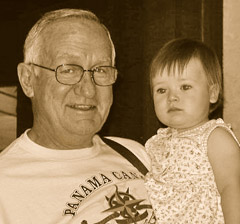 |
|||||||||||||||||||||||||||||||||||||||
|
Cork (who is quite a bit like his dad) & his Granddaughter, Cameron Sisney.
|
|||||||||||||||||||||||||||||||||||||||
|
Besides his regular employment, though, one of the greatest testimonies to Charlie's work ethic was the first house he bought, the house where Cork and Mollyann grew up. It was all of 900 square feet, cost $2500 and required 10% down. Most people who lived through the depression can identify with Charlie's plight. He didn't have the $250 to put down, or anything like $250. So what he did was work it off. For every house in that subdivision, he dug the septic tank, dug all the laterals and lathed each wall, all this done at nights and on weekends, all for the princely sum of $250. It was hard work, very hard work, but it was also a labor of love, because it meant that his wife and son and daughter would have a home, a place to call their own, and in Charlie's mind, this sweat equity was time and effort very well invested. |
|||||||||||||||||||||||||||||||||||||||
| Best Family Story -was of their cousin Leonard knocking on the door late one night, wearing his Navy uniform, just discharged following the war, and saying, "Uncle Charlie, I'm going to enroll at A&M next semester, and I'd like to stay at your house tonight, if I could." You have to understand that neither Cork nor Mollyann had ever met their cousin Leonard, and that he was a little shaver, knee-high to a grasshopper, when Charlie had last seen him. But that didn't matter. He was family, and Charlie said, sure, you can spend the night. And in fact, he spent the night in that 900 square foot house for the next four years, and nobody ever complained or thought a thing about it. That's just the way it was when you were part of Charlie's family. Cork and Leonard were like brothers until Leonard died in 1975. |  |
||||||||||||||||||||||||||||||||||||||
|
Leonard Platt
|
|||||||||||||||||||||||||||||||||||||||
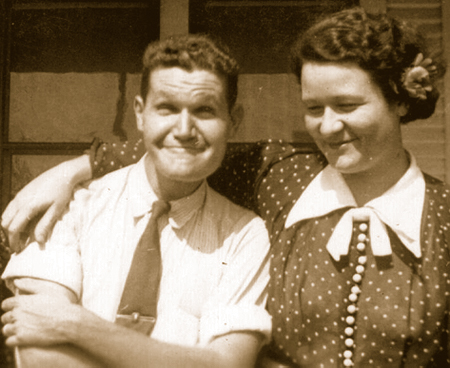 |
|||||||||||||||||||||||||||||||||||||||
| Typical Charles and his tolerant sister Nora. | |||||||||||||||||||||||||||||||||||||||
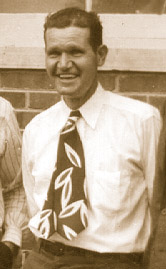 |
|||||||||||||||||||||||||||||||||||||||
|
In his adult life, Charlie basically had three jobs, two of which were very similar. For 12 years, he was employed as a wholesale salesman for the Midwest Creamery and then for 18 in a similar position for the General Baking Company. Meaning that for 30 years, six days a week, he was in virtually every store in Stillwater, delivering either milk or bread. Now being out and about in the community as he was, day after day for three decades, Charlie got to meet practically everyone in town, and since he never met a stranger, he got to know practically everyone in town, as well. Everybody knew Charlie. He was one of the most well-recognized people in all of Stillwater. And in these jobs, Charlie was known for his honesty. As he came in and out of the various stores, there were receipts for the owners and managers to sign, attesting to how many bottles of milk or loaves of bread held brought in. But so trusted was Charlie that they almost never bothered to count how many of each item there was. If he said held delivered a dozen loaves of bread, they knew he had delivered a dozen loaves of bread, and they'd sign the receipt without a worry.
From 1960 until he retired in 1974, he served as the manager of the Receiving Station at OSU, responsible for receiving and sending all freight shipments for the university, and once again, this was a position where Charlie got to know everybody who was anybody at the college. He endeared himself in such a way to the faculty, in fact, that they fondly called the Quonset hut housing the Receiving Station "Charlie's Mule Barn," and Charlie took that moniker as a compliment, which it was. He and Donna Mae never missed a college football game and were pretty well known as "OSU's Biggest Fans". At family reunions to this day, no one dares to admit to preferring any other college team over OSU and the ball caps better not represent OU. |
|||||||||||||||||||||||||||||||||||||||
| Cork and Mollyann both said that among the things they were grateful for in his last few years was the way their father accepted their taking over his life, that he never gave them a minute's problem. When they suggested his moving to a nursing home in Ardmore, he didn't fight it - though he loved Stillwater dearly. He simply understood that they had his best interest in mind, and so did what they wanted.
Among the things that Charlie turned over to his son were his finances, and he had only one question about how his money was being handled, a question he asked Cork virtually every time they talked: "Did you write a check to the church this month?" Even in his last days, his concern was for the congregation that had nurtured his faith for so long. Charlie went to worship every Sunday in the nursing home, and, no surprise, he really loved the singing. And when there were community sing-a-longs, he would sometimes be the leader, and a dear memory for Mollyann is that the last song she and her daddy sang together was "When the Roll is Called Up Yonder". He died on September 29, 1999 at age 90. |
|||||||||||||||||||||||||||||||||||||||
| Leonard Platt's wife Jean and Charles at the 1999 reunion, shortly before his death. | |||||||||||||||||||||||||||||||||||||||
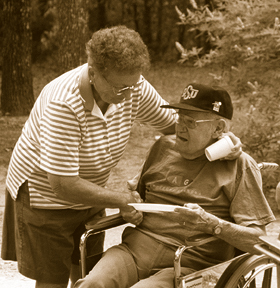 |
|||||||||||||||||||||||||||||||||||||||
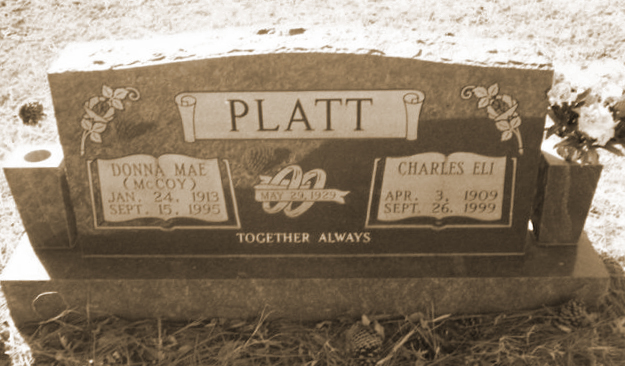 |
|||||||||||||||||||||||||||||||||||||||